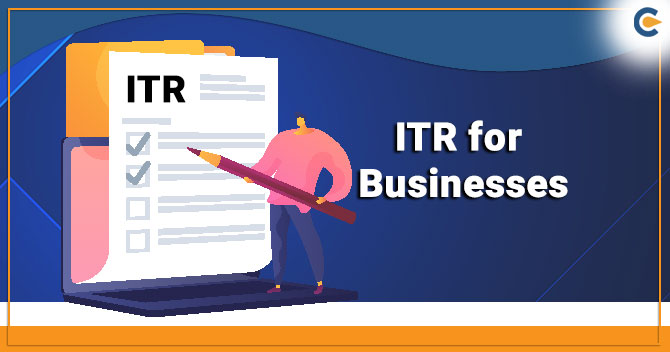Filing a business tax return is fundamentally the process by which a firm has to disclose its income & expenses to the IT department. All businesses pan India, regardless of their size; have to file ITR every year within the prescribed deadlines. Filling ITR for businesses is somewhat complicated as compared to the filing requirement of the individual taxpayer.
ITR for businesses refers to a statement reflecting the income and expenditure of the firm. If it reaps some profits, tax needs to be paid for the same under the company existing law. Apart from addressing tax liabilities, a business may also be required to file TDS (tax deduction at source) as per the applicable law. In this write-up, you will learn everything about filing ITR for businesses in detail.
Prerequisites Regarding ITR for Businesses
Filing business tax returns will depend on the nature of the business-i.e. tax structure will depend on whether you are operating as a proprietorship, partnership firm, LLP, or a private limited company.
If you meet specific requirements, you have to maintain a book of accounts.
If you fulfill any of the given condition as a business, then maintaining the books of accounts is compulsory. Income is greater than Rs 1,20,000; or total sales, gross receipts, or turnover greater than Rs. 10,00,000 in any of the three preceding years.
Businesses require using the Sugam ITR-4 for ITR if they choose for the presumptive income scheme u/s 44AD and 44AE of the Income Tax Act. Any business whose yearly revenue is well below Rs 2 crore can choose to be taxed presumptively by the IT department. Such companies must declare a profit of 8% related to non-digital transactions or 6% for digital transactions accordingly as per their case.
When opting for a presumptive taxation scheme, a business can disclose its income at a predetermined rate and, in turn, does not need to confront the trouble of maintaining accounts. However, the presumptive taxation scheme is accessible to resident partnership firm (not limited liability partnership firm)
Read our article:What is the Claiming Process of Income Tax Refund?
Eligibility Criteria Relating to ITR for Businesses
If you are managing a sole proprietorship firm, your business income & other personal income, such as income from house property and interest income, has to integrate under the same return. If your aggregate income is above the taxable limit of Rs 2.5 lakh, you have to file ITR without exceptions. Business owners below the age of 60 are liable to file the ITR if the total incomes surpass Rs 2.5 lakh.
If the business owners serving the age between 60-80 years, filing ITR is compulsory if the aggregate income surpasses Rs 3 lakh. Meanwhile, the proprietors serving the age of 80 years and above are liable to file ITR if the aggregate income exceeds Rs.5 lakh. Below is the tabular representation for the same.
INFOGRAPHIC
| Individual’s Age | Basic Exemption (INR) |
| Below 60 years | 2.5 lakh |
| Between 60-80 (Senior citizen) | 3 lakh |
| 80 years & above | 5 lakh |
For firms and LLPs, a business tax return must be filled regardless of the profit and loss. Even if such businesses have been out of operation for a while, return filing is mandatory.
All partnership-based companies are liable to file an ITR every year, regardless of the income or loss. In the absence of the business activity, a NIL ITR must be filed before the deadline. The same rule is applicable to the companies working as an LLP in India. All registered companies in our country are needed to file ITR every year, regardless of profit and loss. Even the dormant firm with no transaction record is subjected to filing ITR for businesses every year in India.
Rate of Income Rate Applicable to the Firms
When looking at how to file ITR for businesses, we need to explore the income tax rate for firms. The tax rate applicable to the LLPs and partnership firms is set to 30%. If income exceeds the one crore mark, then an additional surcharge of 12% would be levied. Health and education cess @ 3% would be levied on the amount of tax estimated, including surcharge.
The rate of tax for the companies operating in India is set to 30%. However, if the company’s annual revenue does not surpass Rs 250cr in the preceding year, the company is liable to pay tax @ 25%.
The applicability of surcharge will depend on certain conditions. In a situation where income falls between Rs 1-10 crore, the surcharge is 7% of the income tax amount will be applicable. The surcharge of 12% shall be applicable to the amount exceeding the said limit. The IT department renders marginal relief to firms in special cases.
Applicability of the Income Tax Audit
The IT department has laid down some provisions for the tax audit u/s 44AB of the Income Tax Act 1961[1]. The primary objective of the income tax audit is that a company or individual’s taxes are scrutinized by the external authority to determine all the details relating to income, expenditure & deduction have been filed correctly. The IT department has mandated the Income-tax audit for all eligible taxpayers as per norms of Section 44AB of the Income Tax Act.
An Income Tax audit serves different purposes. It makes sure that all the businesses should compulsorily maintain a book of account and other expenditures and revenue records systematically. A tax audit also ensures that the aggregate incomes & claims related to deductions are validly provided when filing the return. This mitigates the chance of fraud.
Income tax audit applies to specific categories of businesses. If a proprietor is carrying out a business operation and their sales revenue surpasses Rs 1 lakh, a tax audit is compulsory. LLPs with a yearly turnover greater than Rs 40 lakh needs to audit their accounts by CAs, All categories of firms, be it privately held company or OPC need to get a tax audit done regardless of the annual turnover.
Conclusion
Filing ITR is a way of intimating the tax authorities about the total income that you have earned during a specific fiscal year and that you have addressed tax liability on that income accordingly. As per the existing income tax norms, it is only compulsory for a taxpayer to file an income tax return if his/her income meets specific predetermined criteria. Hence, we can conclude filing ITR for businesses is also equally crucial for the employers seeking tax credit and other benefits from the government.
Read our article:Income Tax Returns: Which is the Correct ITR Form for you?











